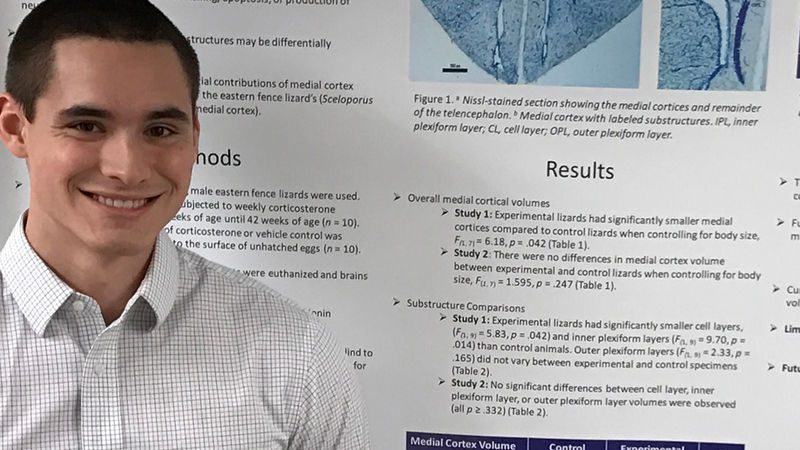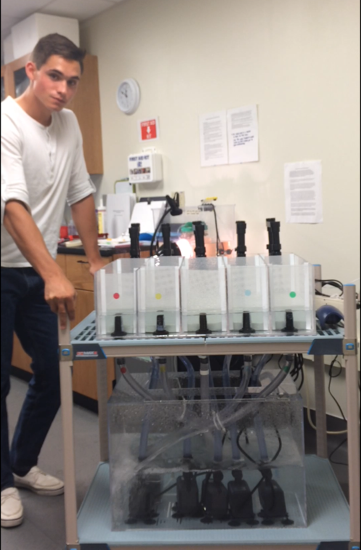

This dialog contains the full navigation menu for this site.

Why do people behave in the way they do? Put three people in the same situation and there is no guarantee that all three will react in the same manner. Coming upon a car accident, one might stop, maybe grabbing a blanket out of the car to help the injured. Another might just call 911 and wait for professional help. The third person might just drive on, not wishing to “get involved.” But why?
The study of psychology helps answer that and many other questions about human behavior. And that’s what drew Penn State Altoona student John Leri to change his major.
Leri enrolled at Penn State Altoona intending to be a business major. But then he started working with Samantha Tornello, assistant professor of psychology and women’s, gender, and sexuality studies, and, he said, “I realized that the research that surrounded psychology was what I was interested in — the culture of science, the process of science. You get to ask a question and then try to answer it.” So he switched majors.
“I felt I would have a more well-rounded view of the world if I focused on how people behave as opposed to how they act in a business setting. It felt right once I was there," he said.
Due to his hard work, Leri was enrolled in the Schreyer Honors College, where one of the requirements is writing a thesis. “Because I was interested in research I did an independent study on depression, specifically looking at how people interact with depressed people,” he said.
Exploring the concept of “social distance,” defined as “an individual’s willingness to associate (or not) with another person,” Leri recruited 425 participants and found that people were equally willing to interact with those with depression whether or not the people with depression were taking antidepressants.
“Those who held greater stigmatizing beliefs regarding depression, greater social-dominance orientation, and less personal exposure to mental illness reported wanting greater social distance to the individual diagnosed with depression, regardless of treatment status," said Leri. "These results suggest that both mental illness exposure and depression-related stigma can be useful areas of interventions to reduce negative attitudes toward individuals diagnosed with depression.”
At the same time Leri was researching and writing his thesis, he was employed as a research assistant in Tornello’s lab, so she heard regular updates on his progress. She was impressed with his dedication and passion. “He talked about it in great depth,” Tornello said. “He took the reins — spearheading the data collection and data analysis, and writing the manuscript.” His efforts, she acknowledged, were “equal to students in graduate school.”
Lynn Nagle, instructor in psychology and education, first had Leri in some psychology classes and then served as his faculty adviser for his Psych 495 internship. “Somewhere along the way,” she said, “I recruited his involvement with the Psychology Club. Being John, he quickly realized if he was going to be involved with Psychology Club, he was going to run the show, and that he did.”
Leri was elected president of the club for the 2015–16 academic year and Nagle said he was a great asset: “He generated novel ideas and increased attendance and participation at Psychology Club events. He was truly invaluable to me as an officer.”
The internship Leri had was at NPC, Inc., a document processing service in Roaring Springs, where he helped to refine their job application process. Nagle said, “When I supervised his internship based in the field of industrial organization psychology, he was not only focused on improving the employee work environment and making the training more effective, he was truly interested in what drove the employees; he seemed to be trying to decipher employee internal motivation.”

Leri with the zebrafish swim tunnel
In his senior year Leri worked on research projects for two more Penn State Altoona faculty: Cairsty DePasquale and Lara LaDage, both assistant professors of biology. DePasquale’s research fits well with Leri’s interest in why people behave the way they do.
“Anecdotal evidence shows exercise can reduce anxiety and depression,” DePasquale said, noting “human studies where exercise regimes can reduce anxiety. Similar results occur with animal models.”
To study the effects of exercise on zebrafish, DePasquale had Leri use a swim tunnel built by engineers on campus.
This brings questions, such as how does one exercise a fish? “(The swim tunnel) uses channels. We vary the flow of water in the channels and get fish to swim against the flow of water,” DePasquale explained.
So how does one test for anxiety in fish? DePasquale said, “It’s very similar to tests on rodents but we have to adapt to an aquatic environment. We put them in a novel tank with nothing else and the fish will stay at the bottom of the tank. As they begin to explore the tank more, they are more willing to move out of their comfort zone. Fish who move up are less anxious fish. Another test was the light/dark test; fish tend to shy away from bright lights, as do rodents. We use that avoidance to look at anxiety behavior.”
How did Leri like working with the zebrafish? “Working with animals is a pain in the butt,” he said, injecting a little humor into what is serious research. “With humans you can at least give them instructions. Getting (the fish) to read the instructions is the hard part.”
LaDage said, “John joined my and Cairsty’s lab at the same time, which speaks to his interest in, and dedication to, pursuing research opportunities. In my lab he was instrumental in collecting data and writing up a manuscript concerning the assessment of substructural changes in the brain.”
Even though Leri graduated in August 2016 he continued the research work while considering continuing his education in graduate school. In January 2017 Leri presented his research at the Society for Integrative and Comparative Biology meeting in New Orleans.
Leri described their research as follows: “The lizard hippocampal equivalent, the medial cortex, is used to study environmental impact on neural tissue and spatial memory. Although the cortex is comprised of three substrates, each with differentiating traits in cellular architecture, studies typically use overall volume as an outcome variable. Our research showed that overall volume may not accurately represent changes taking place within cortical substrates.”
Leri attended the Eastern Psychological Association conference in Boston in March and presented a poster based on his honors thesis and his work with Tornello. “It discusses the predictive role of negative attitudes associated with depression and willingness to interact with an individual diagnosed with depression,” he explained.
Nagle echoed Leri's other professors when she said, “John is one of those stellar students, who you wish you could replicate. He’s cordial, respectful and has an incredible work ethic. He has a great sense of humor and is very interesting to talk with. He has such a wide range of experiences, I think anyone could find something in common with him and once you get him talking, he just lights up. I can’t wait to see where John goes to grad school and how accomplished he will become.”
Leri has now chosen his path. Beginning in the fall of 2017 he will attend the University of Florida to work under Darlene Kertes. Once again, he’ll be tackling more than one subject. “I have been admitted into the behavioral and cognitive neuroscience (psychology) program," he said.
Based on his history of taking on more than one project at a time at Penn State Altoona, it’s no surprise that he’s planning to pursue a dual doctorate in behavior and cognitive neuroscience and social psychology. A long way from that first-year business major but, for John Leri, definitely the right path.


